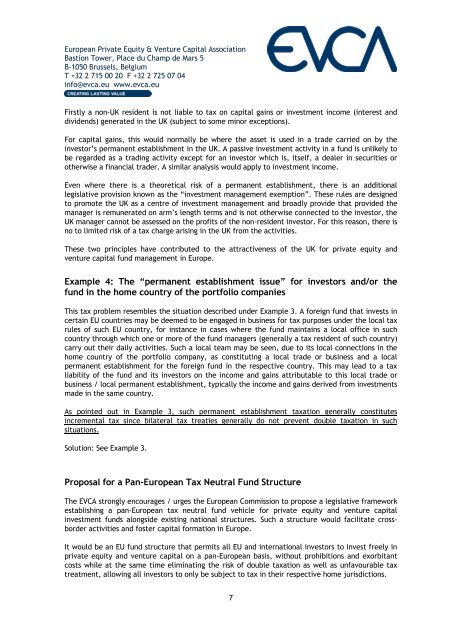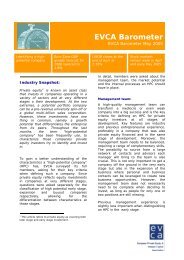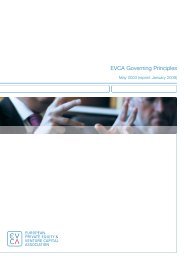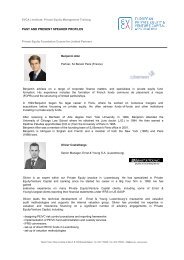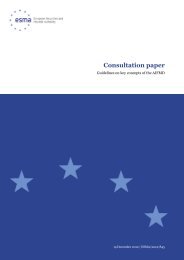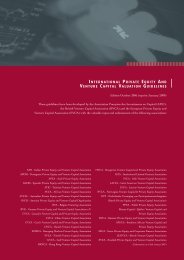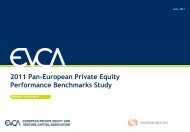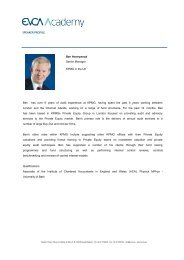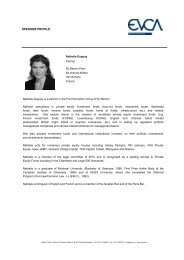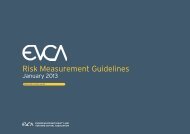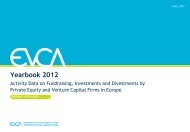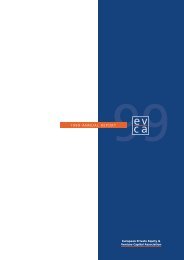European Private Equity & Venture Capital Association ... - EVCA
European Private Equity & Venture Capital Association ... - EVCA
European Private Equity & Venture Capital Association ... - EVCA
- No tags were found...
Create successful ePaper yourself
Turn your PDF publications into a flip-book with our unique Google optimized e-Paper software.
<strong>European</strong> <strong>Private</strong> <strong>Equity</strong> & <strong>Venture</strong> <strong>Capital</strong> <strong>Association</strong>Bastion Tower, Place du Champ de Mars 5B-1050 Brussels, BelgiumT +32 2 715 00 20 F +32 2 725 07 04info@evca.eu www.evca.euFirstly a non-UK resident is not liable to tax on capital gains or investment income (interest anddividends) generated in the UK (subject to some minor exceptions).For capital gains, this would normally be where the asset is used in a trade carried on by theinvestor’s permanent establishment in the UK. A passive investment activity in a fund is unlikely tobe regarded as a trading activity except for an investor which is, itself, a dealer in securities orotherwise a financial trader. A similar analysis would apply to investment income.Even where there is a theoretical risk of a permanent establishment, there is an additionallegislative provision known as the “investment management exemption”. These rules are designedto promote the UK as a centre of investment management and broadly provide that provided themanager is remunerated on arm’s length terms and is not otherwise connected to the investor, theUK manager cannot be assessed on the profits of the non-resident investor. For this reason, there isno to limited risk of a tax charge arising in the UK from the activities.These two principles have contributed to the attractiveness of the UK for private equity andventure capital fund management in Europe.Example 4: The “permanent establishment issue” for investors and/or thefund in the home country of the portfolio companiesThis tax problem resembles the situation described under Example 3. A foreign fund that invests incertain EU countries may be deemed to be engaged in business for tax purposes under the local taxrules of such EU country, for instance in cases where the fund maintains a local office in suchcountry through which one or more of the fund managers (generally a tax resident of such country)carry out their daily activities. Such a local team may be seen, due to its local connections in thehome country of the portfolio company, as constituting a local trade or business and a localpermanent establishment for the foreign fund in the respective country. This may lead to a taxliability of the fund and its investors on the income and gains attributable to this local trade orbusiness / local permanent establishment, typically the income and gains derived from investmentsmade in the same country.As pointed out in Example 3, such permanent establishment taxation generally constitutesincremental tax since bilateral tax treaties generally do not prevent double taxation in suchsituations.Solution: See Example 3.Proposal for a Pan-<strong>European</strong> Tax Neutral Fund StructureThe <strong>EVCA</strong> strongly encourages / urges the <strong>European</strong> Commission to propose a legislative frameworkestablishing a pan-<strong>European</strong> tax neutral fund vehicle for private equity and venture capitalinvestment funds alongside existing national structures. Such a structure would facilitate crossborderactivities and foster capital formation in Europe.It would be an EU fund structure that permits all EU and international investors to invest freely inprivate equity and venture capital on a pan-<strong>European</strong> basis, without prohibitions and exorbitantcosts while at the same time eliminating the risk of double taxation as well as unfavourable taxtreatment, allowing all investors to only be subject to tax in their respective home jurisdictions.7


